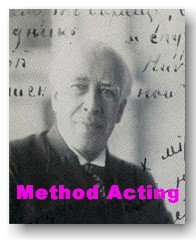[ advertising space : webmaster ]
text LINKS

contents
Featured Pages : this page is from Preface for System of the Method @ Theatre with Anatoly website.
I do not think that American promoters of Stanislavsky did a good job. He called his acting school "System" for a reason. "Method" is not the same.
There are many methods and techniques, my friends. At the end, you have to have YOUR OWN method. What Stanislavsky had in mind was to offer actor the rules of acting, the system for developing your own methods of acting. Very much like physics or math, or science. How will you use it is entirely up to you.
Method is an application of the System.
What I try to do is to "restore" the System which is behind the Method Acting.
Let me make it clear. If you learn Method, you will make money acting. If you will learn the System, you are a star. If you can develop your own method, you are a master. If you discover your SYSTEM, you belong to Theatre History books.
How to make this horror work for you is the science. As any science it's systematic; it has to be followed the way we obey the laws of gravity or electricity. We do not fight the laws of nature, we make them work for us. If you are ignorate of those laws, you break your neck and get burned.
vtheatre.net
Key Terms: Glossary
my calendar
act.vtheatre.net
direct.vtheatre.net
film.vtheatre.net
script.vtheatre.net
shows.vtheatre.net
web.vtheatre.net
method.vtheatre.net
webmaster

Theory of Spectatorship

GeoAlaska: Theatre & Film

theatre books
Mailing List & News -- subscribe yourself *


Method for Directors?

ShowCases: 3 Sisters, Mikado, 12th Night, Hamlet, The Importance of Being Earnest, Dangerous Liaisons, Don Juan: Director's BOOK

my eGroups
I only can repeate what Meyerhold believed that many years ago: no, there is not too much theory about acting, on the contrary, not enough!


A clear, modern presentation of Konstantin Stanislavski's methods of actor training and rehearsal.
It is based on the course Stanislavski designed and taught with a team of hand-picked assistants in the last three years of his life (1935-38) at the Opera-Dramatic Studio in Moscow.
This was his true testament on his teachings, but he never wrote it down in the form of notes. Jean Benedetti now reconstructs that course.
Using notes made by Stanislavski's assistants, exercises and improvisations used in class, transcripts of Stanislavski's own master classes (translated here into English for the first time) and knowledge of Stanislavski's earlier writings, Benedetti builds up a comprehensive description of the system in contemporary language that is easy to understand by today's actors and teachers.
Summary
Several areas are not explained: Yoga and Stanislavsky, Freud and Method, Pavlov and "Phychological Body of Actor" -- more. Spirits and spirituality...Questions
Russian mysticism, ritual, shamanism and mediums, resurrection concept... using shamanistic techniques and methods in any given program (e.g., visualization, altered states of consciousness, sensory manipulation, dream work). [ Shamism in Siberia ] Heritage of the four centuries of the Mongol domination (Banzaroff, The Black Faith). Actor and shaman (As among all primitive religions, the rуle of the priest, as the repository of religious beliefs and traditions, is of the greatest importance; therefore we shall first proceed to the study of the shaman himself).
meyerhord.us
Notes
About the connection between Christianity and Method -- in The Book of Spectator (Theology of Theatre).
"Whether his calling be hereditary or not, a shaman must be a capable-nay, an inspired person. Of course, this is practically the same thing as saying that he is nervous and excitable, often to the verge of insanity. So long as he practises his vocation, however, the shaman never passes this verge. It often happens that before entering the calling persons have had serious nervous affections." [replace "shaman" with "actor" or "artist"].
Anton Chekhov V: writer (script analysis pages) some in russian:
К. С. Станиславский (Stanislavsky on A. Chekhov)
А. П. ЧЕХОВ В ХУДОЖЕСТВЕННОМ ТЕАТРЕ (Воспоминания)
"Мне трудно покаяться в том, что Антон Павлович был
мне в то время мало симпатичен.
Он мне казался гордым, надменным и не без хитрости.
Потому ли, что его манера запрокидывать назад голову
придавала ему такой вид, — но она происходила от его
близорукости: так ему было удобнее смотреть через
пенсне. Привычка ли глядеть поверх говорящего с ним,
или суетливая манера ежеминутно поправлять пенсне
делали его в моих глазах надменным и неискренним, но
на самом деле все это происходило от милой
застенчивости, которой я в то время уловить не мог."
[ ... ]
" Он бывал почти на всех репетициях своей пьесы, но очень редко, осторожно и почти трусливо выражал свои мнения. Лишь одно он отстаивал особенно энергично: как и в "Дяде Ване", так и здесь он боялся, чтобы не утрировали и не карикатурили провинциальной жизни, чтобы из военных не делали обычных театральных шаркунов с дребезжащими шпорами, а играли бы простых, милых и хороших людей, одетых в поношенные, а не театральные мундиры, без всяких театрально-военных выправок, поднятий плеч, грубостей и т. д."
* To Read Russian: Windows (view) > encode > Cyrillic
Comparing "System" and "Method" (here?) ...
"I = Hamlet"
In Method "Hamlet" is for ME (self-improvement, art serving life)
According to System, I am for Hamlet (I give my life to art, metaphysics, eternity).
[ ... models-actors (Eisenstein) behave ("celebrities" = "stars"), like animals and children do not act. ]



















